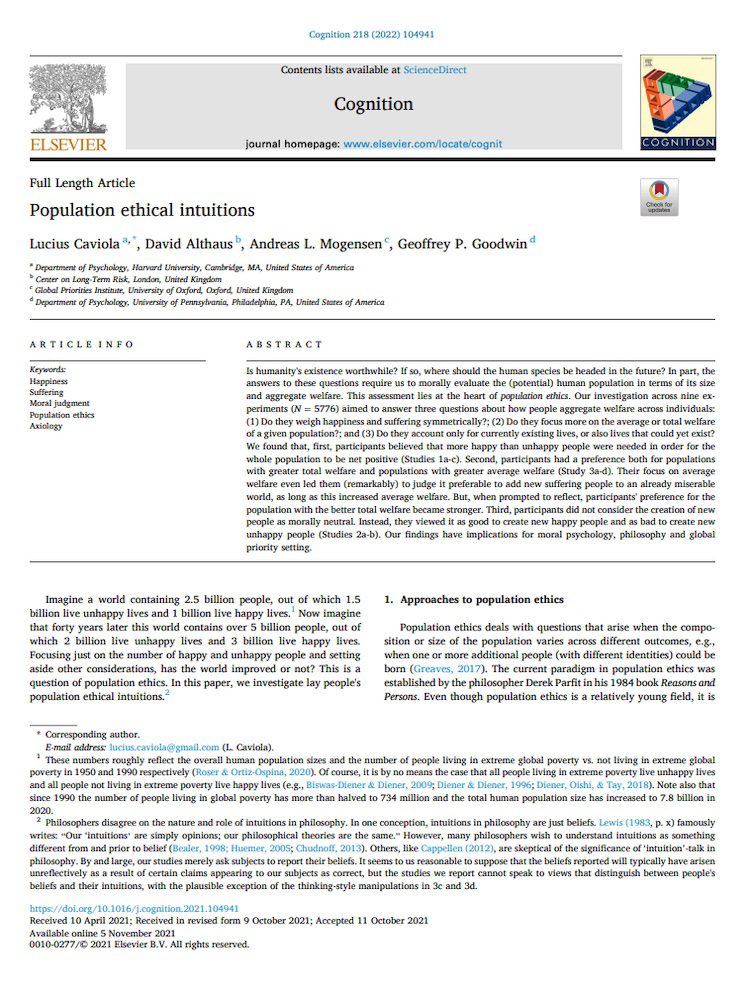Population ethical intuitions
Lucius Caviola (Harvard University), David Althaus (Center on Long-Term Risk), Andreas Mogensen (Global Priorities Institute, University of Oxford) and Geoffrey Goodwin (University of Pennsylvania)
GPI Working Paper No. 3-2024, published in Cognition
Is humanity's existence worthwhile? If so, where should the human species be headed in the future? In part, the answers to these questions require us to morally evaluate the (potential) human population in terms of its size and aggregate welfare. This assessment lies at the heart of population ethics. Our investigation across nine experiments (N = 5776) aimed to answer three questions about how people aggregate welfare across individuals: (1) Do they weigh happiness and suffering symmetrically?; (2) Do they focus more on the average or total welfare of a given population?; and (3) Do they account only for currently existing lives, or also lives that could yet exist? We found that, first, participants believed that more happy than unhappy people were needed in order for the whole population to be net positive (Studies 1a-c). Second, participants had a preference both for populations with greater total welfare and populations with greater average welfare (Study 3a-d). Their focus on average welfare even led them (remarkably) to judge it preferable to add new suffering people to an already miserable world, as long as this increased average welfare. But, when prompted to reflect, participants' preference for the population with the better total welfare became stronger. Third, participants did not consider the creation of new people as morally neutral. Instead, they viewed it as good to create new happy people and as bad to create new unhappy people (Studies 2a-b). Our findings have implications for moral psychology, philosophy and global priority setting.
Other working papers
On two arguments for Fanaticism – Jeffrey Sanford Russell (University of Southern California)
Should we make significant sacrifices to ever-so-slightly lower the chance of extremely bad outcomes, or to ever-so-slightly raise the chance of extremely good outcomes? Fanaticism says yes: for every bad outcome, there is a tiny chance of of extreme disaster that is even worse, and for every good outcome, there is a tiny chance of an enormous good that is even better.
Exceeding expectations: stochastic dominance as a general decision theory – Christian Tarsney (Global Priorities Institute, Oxford University)
The principle that rational agents should maximize expected utility or choiceworthiness is intuitively plausible in many ordinary cases of decision-making under uncertainty. But it is less plausible in cases of extreme, low-probability risk (like Pascal’s Mugging), and intolerably paradoxical in cases like the St. Petersburg and Pasadena games. In this paper I show that, under certain conditions, stochastic dominance reasoning can capture most of the plausible implications of expectational reasoning while avoiding most of its pitfalls…
AI takeover and human disempowerment – Adam Bales (Global Priorities Institute, University of Oxford)
Some take seriously the possibility of AI takeover, where AI systems seize power in a way that leads to human disempowerment. Assessing the likelihood of takeover requires answering empirical questions about the future of AI technologies and the context in which AI will operate. In many cases, philosophers are poorly placed to answer these questions. However, some prior questions are more amenable to philosophical techniques. What does it mean to speak of AI empowerment and human disempowerment? …

